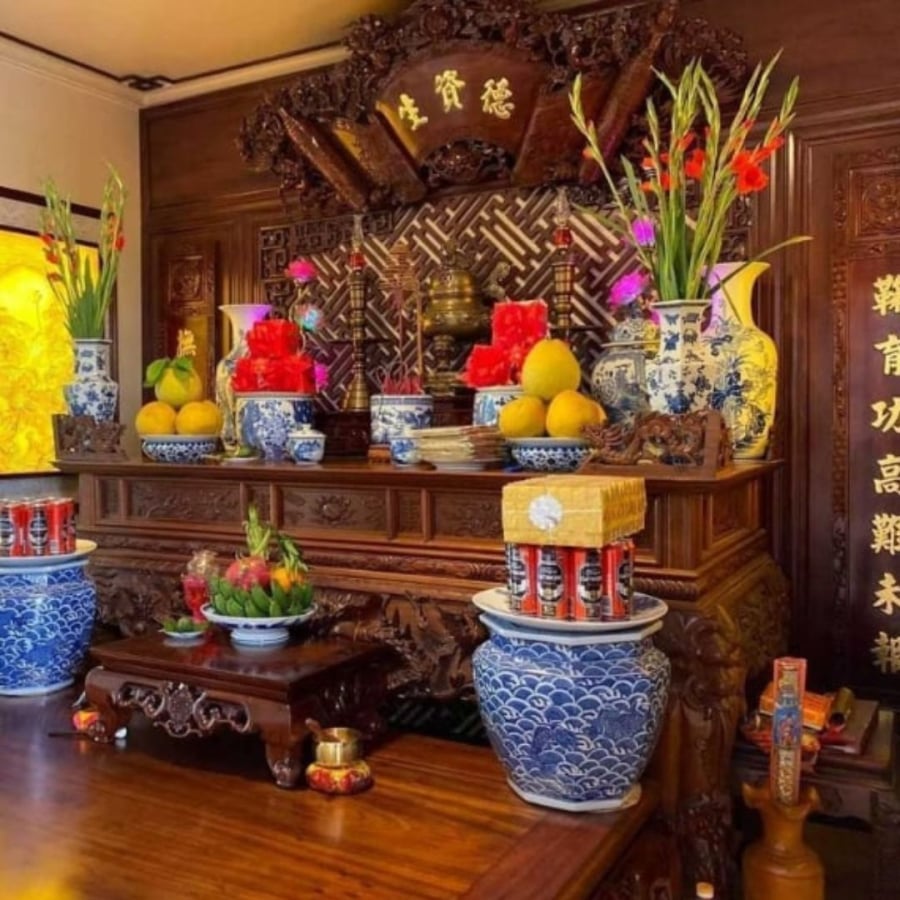In traditional East Asian culture, especially among Vietnamese families, the scents within a home reflect not only tidiness but also hold deep spiritual significance. According to ancient beliefs, the presence of these three distinctive aromas signifies prosperity, abundance, and enduring familial blessings.
1. The Fragrant Incense from the Ancestral Altar – A Symbol of Gratitude and Fortune
The ancestral altar is a sacred space dedicated to honoring ancestors and reflects the homeowner’s respect for tradition and spirituality. A well-maintained altar, exuding the warm fragrance of incense with subtle notes of wood and fresh fruits, embodies reverence and sincerity.
Incense purifies the air, dispels negative energies, and symbolizes the intangible connection between generations. It is believed that a meticulously cared-for altar, adorned with fragrant incense, fresh flowers, and offerings, invites ancestral blessings upon the family, fostering virtue and stability.

Conversely, a neglected altar, dusty and devoid of incense, may disrupt the spiritual balance, making it difficult to attract wealth and peace. Thus, maintaining a warm and clean altar is a simple yet powerful way to nurture familial happiness.
The act of ancestor worship teaches gratitude, a noble quality. It is not about extravagant offerings but rather the consistent care and devotion demonstrated through regular cleaning and visits.
2. The Scent of Books in the Study – Emblem of Wisdom and Enduring Fortune
The ancient proverb, “Knowledge is the key to success,” underscores the importance of the study, workspace, or reading nook within a home. These areas are not merely spaces for learning and labor but also serve as hubs for intellectual energy and sustainable development.
Upon entering a home, a well-ventilated study with neatly organized books emitting a subtle paper aroma indicates a family’s reverence for education and their commitment to continuous learning. The gentle scent of books signifies not only tidiness but also a progressive mindset.

Families that prioritize reading and learning, even without immediate wealth, establish a foundation for long-term prosperity. Conversely, a disorganized and musty workspace can hinder mental clarity and impede cognitive progress. True wealth originates from intellectual prowess, not just fleeting luck.
The more books are read, the more fragrant they become, and the more they are neglected, the mustier they grow.
3. The Aromatic Kitchen – A Symbol of Love and Reunion
In feng shui, the kitchen is considered the “pantry” of the home, where wealth, health, and familial bonds are nurtured. A kitchen filled with the aromas of delicious cuisine and distinctive spices, devoid of stale grease, mold, or lingering garbage, signifies a family’s dedication to their sanctuary.
The kitchen’s fragrances not only awaken the taste buds but also embody love, care, and mutual support. Meals prepared with love ensure proper nutrition and strengthen familial bonds, fostering positive emotions.
Conversely, a cold and neglected kitchen, devoid of culinary delights, can impact both physical and mental health. A cold kitchen may lead to a cooling of affections, creating distance within the family and affecting long-term happiness.

Three Scents, Three Fundamental Elements of a Blessed and Prosperous Family
A home imbued with the trio of aromas—the incense from the altar, the scent of books, and the fragrant kitchen—signifies a family rooted in tradition, education, and blessings. While they may not dwell in luxury, they possess happiness, morality, wisdom, and health—the foundation for enduring wealth.
Conversely, a home lacking one of these three scents risks an imbalance between spirituality, intellect, and practical life. Material wealth, without these foundational scents, may not endure as it lacks the solid roots of a truly happy and blessed family.
Feng shui isn’t just about landforms and house orientations; it’s also about lifestyle, family values, and how we nurture each space within our sanctuary. By tending to our ancestral altars, cleaning our study areas, and cooking with love, we create positive aromas that nurture our souls and attract fortune and tranquility.
Reference for contemplation
































